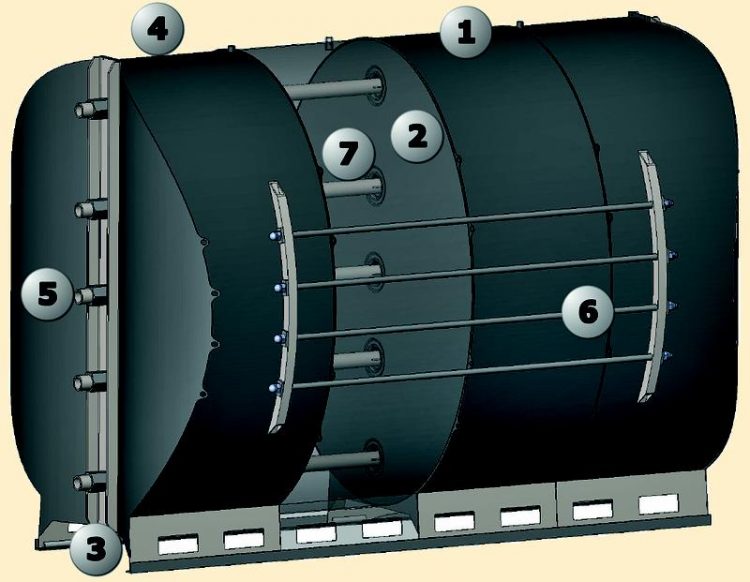Modular storage tank for tight spaces

This UniSto storage tank consists of four modules. © Consolar
The thermal storage tank is not fully assembled until it reaches the boiler room
The individual oval steel modules of the storage tank are mounted close to each other on rails during the installation and are then pushed together. They have a volume of 1350 litres each. The pipe connections between the individual modules are in the vessel.
“UniSto”, as the new storage tank is called, offers the same volume but a smaller and fully insulated surface, which reduces heat loss. It is insulated with hard shells of expanded polystyrene. Vacuum insulation panels (VIP) can be fitted in the cavities within the hard shells if required.
The storage tank has already been trialled in several field tests. For example, a Swiss-German energy supply company installed a prototype in a nursing home in Rheinfelden.
A heat-led, gas-fired combined heat and power plant and a gas condensing boiler for peak loads meet all heating requirements of the 74 residential units and partially cover the electricity demand.
The storage tank is hydraulically integrated in the system so that it stores the waste heat from the combined heat and power system and can make it available both for space heating and heating drinking water.
Research in the “UniSto” project was performed by an industrial consortium involving the Institute for Thermodynamics and Thermal Engineering (University of Stuttgart) and Consolar Solare Energiesysteme GmbH, among others.
You found all informations about the BINE Projektinfo brochure entitled “Large storage tank developed for small spaces” here:
http://www.bine.info/en/press/press-releases/press/pressemitteilung/modularer-sp…
Uwe Milles/Birgit Schneider
presse(at)bine.info
About BINE Information Service
Energy research for practical applications
The BINE Information Service reports on energy research topics, such as new materials, systems and components, as well as innovative concepts and methods. The knowledge gained is incorporated into the implementation of new technologies in practice, because first-rate information provides a basis for pioneering decisions, whether in the planning of energy-optimised buildings, increasing the efficiency of industrial processes, or integrating renewable energy sources into existing systems.
About FIZ Karlsruhe
FIZ Karlsruhe – Leibniz Institute for Information Infrastructure is a not-for-profit organization with the public mission to make sci-tech information from all over the world publicly available and to provide related services in order to support the national and international transfer of knowledge and the promotion of innovation.
Our business areas:
• STN International – the world’s leading online service for research and patent information in science and technology
• KnowEsis – innovative eScience solutions to support the process of research in all its stages, and throughout all scientific disciplines
• Databases and Information Services – Databases and science portals in mathematics, computer science, crystallography, chemistry, and energy technology
FIZ Karlsruhe is a member of the Leibniz Association (WGL) which consists of 87 German research and infrastructure institutions.
http://www.bine.info/en – BINE Informationsdienst
Media Contact
All latest news from the category: Architecture and Construction
Newest articles

NASA: Mystery of life’s handedness deepens
The mystery of why life uses molecules with specific orientations has deepened with a NASA-funded discovery that RNA — a key molecule thought to have potentially held the instructions for…

What are the effects of historic lithium mining on water quality?
Study reveals low levels of common contaminants but high levels of other elements in waters associated with an abandoned lithium mine. Lithium ore and mining waste from a historic lithium…

Quantum-inspired design boosts efficiency of heat-to-electricity conversion
Rice engineers take unconventional route to improving thermophotovoltaic systems. Researchers at Rice University have found a new way to improve a key element of thermophotovoltaic (TPV) systems, which convert heat…



